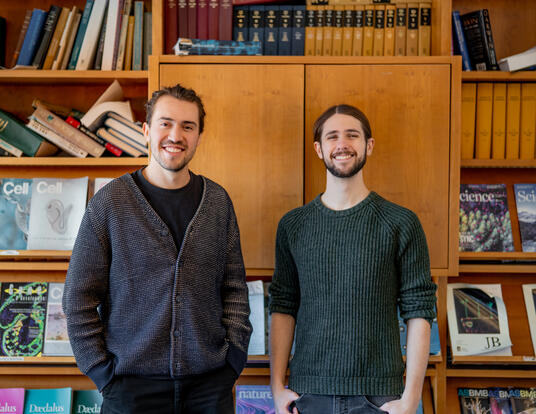Colloquy Podcast: The Problem with Humanizing AI
Artificial intelligence is becoming more powerful and more present in our everyday lives. As more people turn to AI for help with everything from education to parenting advice, are critical mistakes being made in how it is used and understood? In this talk given at the 2025 Harvard Horizons Symposium, economics PhD candidate Raphaël Raux discusses his project, "Human Learning about AI," conducted in collaboration with fellow PhD student Bnaya Dreyfuss. Their research explores how people often project human ways of thinking onto AI systems, leading to misunderstandings about what these technologies can and can’t do. This tendency, known as anthropomorphism, can cause us to either overestimate or underestimate AI’s abilities, sometimes with real-world consequences.
Read or listen below to learn how behavioral economics can help us better understand our relationship with AI and make smarter, more informed choices in how we use it.
This transcript has been edited for clarity and correctness.
AI is now everywhere we look, and its promises are immense: promises of revolution in crucial economic sectors like finance, education, or health care; promises of a better future where interactions with AI will magnify human possibilities–but promises are only part of the story. We also need to make sure that as humans, we can fully harness the potential of AI. And that's what I study as a behavioral economist. My research leverages economic tools such as theory and experiments to understand our interactions with technology and help us improve our usage.
What makes AI so unique as a technology is that it defies expectations in both senses of the term. On the one hand, AI is a constant source of wonder–it keeps acing difficult exams or outclassing our best experts. On the other hand, AI often makes comical mistakes and can underperform on tasks that appear trivial to us. So where does this puzzling duality come from? To understand this, it's helpful to notice that at its core, AI only does one thing. It predicts. It is trained on massive amounts of data and can learn the finer statistical patterns in this data well enough to be able to recreate human-like text or images, for example. This one thing, it does it incredibly well.
As humans, we are also able to predict–but not nearly as well as AI can. However, our intelligence is not only predictive. It is, for example, perceptive, or creative, or even emotional. In other words, human and artificial intelligence are very different things. And this helps explain the duality I mentioned earlier. Because our intelligences differ so much, what makes something difficult for humans may be different for AI and vice versa. But do people realize this when interacting with AI?
If we go back to our opening examples, do we notice anything? It seems that often AI is being portrayed in a human-like fashion. There's a name for this: anthropomorphism. We know it can be beneficial. Lots of research has shown that we tend to trust more the machines that are made to appear humanlike. But if we portray AI as human, will we think that it will behave and perform like a human? In other words, will this lead to the projection of human traits onto AI?
Together with a fellow PhD student, we studied this concept of projection and how it affects our expectations of AI, our reactions to its mistakes, and our optimization of its usage. First, expectations. We tested humans and AI on hundreds of mathematical problems of various difficulty. We then asked subjects to predict their performance. What we see is expectations for humans in orange and for AI in blue. We see that in both cases, people expect performance to decrease with the human difficulty of the problems. We then compare these expectations with reality.
What we found is that expectations for humans are fairly accurate. They are, however, much less so for AI. And the reason is AI performance does not decrease with human difficulty in this context. Yet people still believe it does. In other words, we found a projection of difficulty onto AI. And this leads people to overestimate AI on the easier problems and underestimate it on the harder ones.
From expectations, we then moved on to study our reactions to the mistake that AI makes. We designed an experiment where parents asked AI questions related to childcare. And this AI is overall very accurate. 95 percent of the time, it provided answers that were deemed to be helpful, and only around 5 percent did it make mistakes. To understand the experiment, picture yourself as a parent asking AI a question. For example, what brand of car seat you should buy for your baby. And then you receive this answer. Now clearly, this is a mistake. You're likely to reduce your trust in this AI as a result, which is what we find.
Now instead, imagine that you were to receive this other answer. Now here, would you even ask another question? And indeed, we found that the second mistake led to a much larger breach of trust and made subjects less likely to keep asking questions to the AI. Why is that? Well, the second mistake is clearly less reasonable than the first. And as humans, we tend to see the reasonableness of individual answers as a sign of overall competence. One unreasonable answer from someone makes us think that future answers coming from this person are unlikely to be any helpful. But remember, this AI is very helpful 95 percent of the time. In other words, the projection of reasonableness can lead to overreactions to AI answers and we end up shunning a tool that can still be beneficial.
Finally, we studied whether projection could influence our optimization of AI usage. In our final experiment, we looked at how well people were delegating tasks to AI as we varied its framing. We compared the typical humanlike framing of AI with the blackbox framing, where we removed any references to a human being. And we confirmed that, indeed, the blackbox framing led to a higher share of optimal usage of AI.
Now together, these studies suggests that there are pitfalls to anthropomorphism. Making our AIs humanlike might still be helpful in generating that initial trust, but it may also backfire by distorting our expectations, generating overreactions, and preventing optimization. If not humanlike, then how could we portray AI? Perhaps we could portray AI for what it is: a tool. Perhaps this may help us realize that like for any other tool, it is not either gamechanging or utterly terrible. What matters is how we use it. Human, or tool? It is not up to me to provide the final answer.
My role as a scientist is to uncover facts about our interactions with technology to help nourish the broader debate around AI. And the stakes of the AI debate are the measure of its promises–immense–and they concern each and every one of us. Here, science alone does not have all the answers, but it may help us ask the right questions. What kind of AI future do we want? It's in our hands. Thank you.
Get the Latest Updates
Join Our Newsletter
Subscribe to Colloquy Podcast
Simplecast





